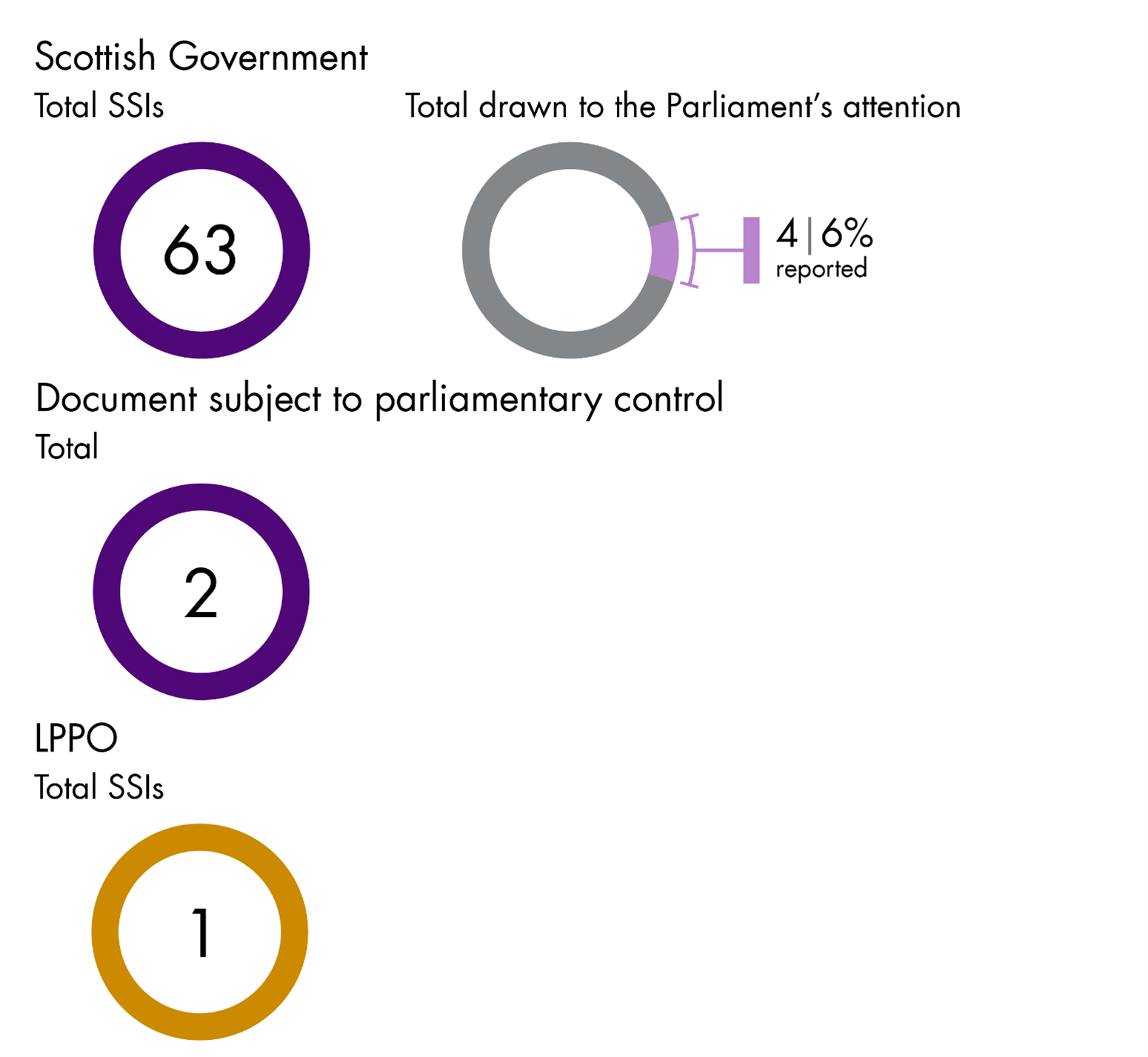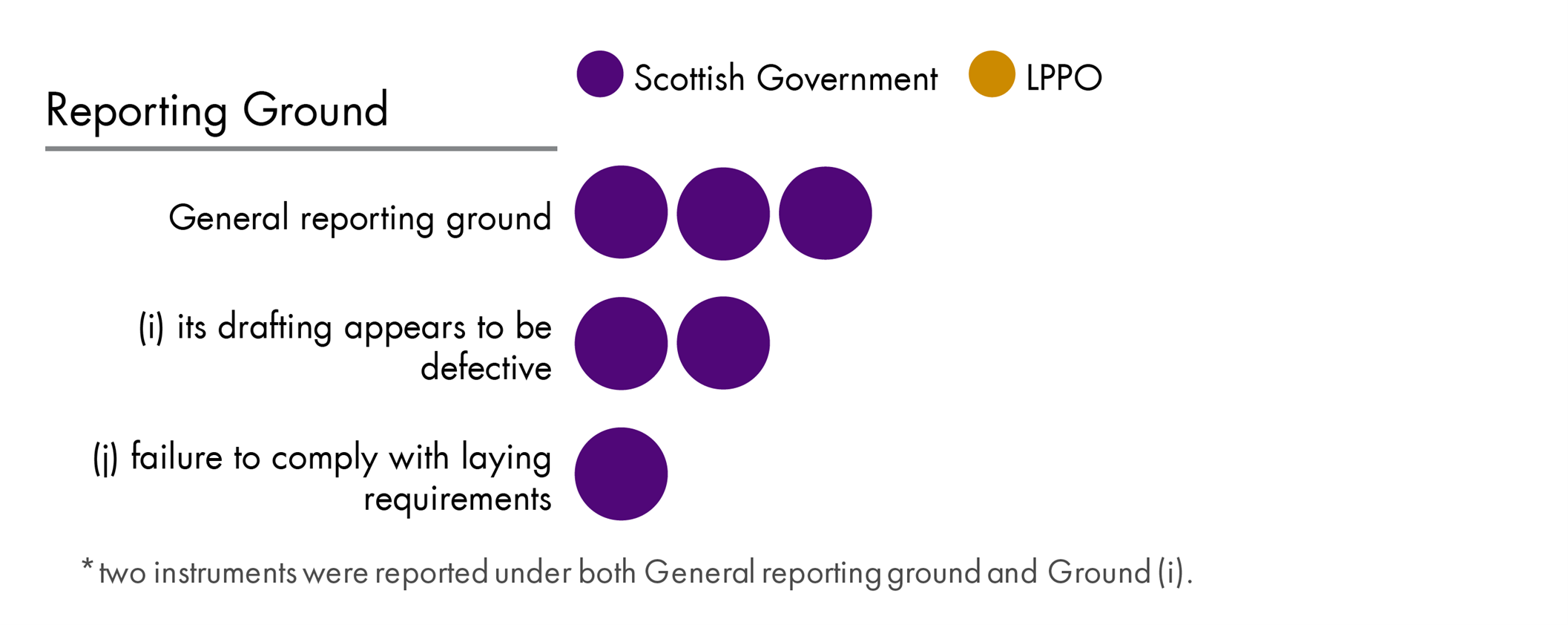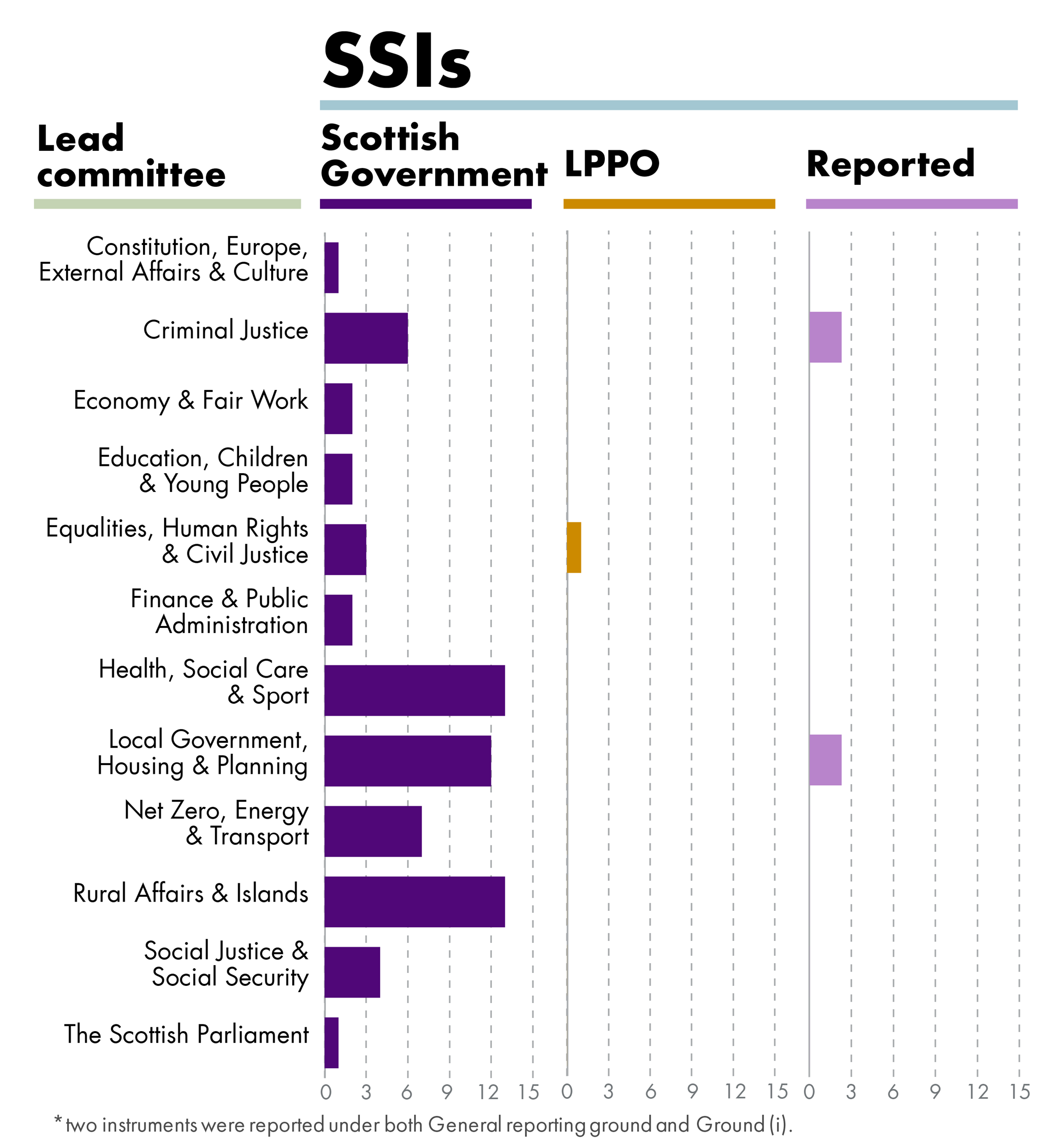Delegated Powers and Law Reform Committee
Instruments considered by the Delegated Powers and Law Reform Committee during the third quarter of the Parliamentary Year 2023-24
Summary
This reporting period covers 8 December 2023 to 29 February 2024.
There was an increase in instruments considered in Quarter 3 compared to Quarter 2 of 2023-24 (66 and 44 respectively). This is an overall increase of 50%.
In terms of the number of instruments being reported, figures for this quarter are lower than the previous quarter, that is 6% of instruments compared with 9% in quarter two.
In total, 4 instruments were drawn to the attention of the Parliament, of which 2 were reported under both the General reporting ground and the significant reporting ground (i) (defective drafting).
There was 1 instrument in the previous quarter that engaged a significant reporting ground.
During this period, 1 instrument was reported under reporting ground (j) (breaching of laying requirements), which is the same as in the previous quarter.
The Committee identified 11 instruments on which minor points were raised (all laid by the Scottish Government). There were 12 in the previous quarter.
The Committee reported on the delegated powers provisions in 7 Bills at Stage 1 and 1 Bill, as amended after Stage 2.
The Committee considered the delegated powers aspects of 3 Legislative Consent Memorandums (LCMs) and reported on 2 of them.
Introduction
The purpose of this report is to provide a record of the Committee’s scrutiny of instruments (e.g., Scottish statutory instruments (SSIs) and UK Statutory Instruments subject to joint procedure in the Scottish Parliament) during the third quarter of the parliamentary year 2023-24 during the period 8 December 2023 to 29 February 2024.
This report—
sets out details of instruments considered by the Committee which were drawn to the attention of the Parliament during the reporting period on one or more of the reporting grounds set out in Standing Orders;
touches briefly on the commitments made by the Scottish Government and the Lord President’s Private Office (LPPO) in response to the Committee’s comments and details any action that has been taken; and
outlines the Committee’s activity in respect of other matters within its remit.
As with previous quarterly reports, this report is intended to be more statistical than analytical to help inform the Committee’s annual report which goes into more detail on the work carried out by the Committee during the parliamentary year. However, the statistics can still be used to highlight emerging themes in advance of the annual report.
Overview and analysis
During this period, a total of 66 instruments, including 2 documents subject to parliamentary control, were considered by the Committee; 1 was laid by the LPPO.
The 63 SSIs laid by the Scottish Government are broken down as follows—
22 affirmative instruments.
34 negative instruments.
7 laid only instruments.
Of the 66 instruments, including 2 documents subject to parliamentary control, considered by the Committee, the Parliament’s attention was drawn to 4 (6%) of them.
The infographic below provides a breakdown of instruments laid by the Scottish Government and the LPPO, and the total instruments drawn to the Parliament’s attention—

In the previous quarter, the Committee considered 44 instruments. The Parliament’s attention was drawn to 4 (9%) of these instruments.
Reporting grounds
Under paragraph (a) of Rule 6.11 of Standing Orders, the Committee may determine that the attention of the Parliament should be drawn to an SSI on one or more of a range of technical and legal grounds. These grounds are set out in Rule 10.3.1 of the Standing Orders.
Reporting grounds: significant
The Committee considers some reporting grounds to be of more significance than others. The Committee has therefore determined that it has concerns where an instrument is drawn to the attention of the Parliament on one of the following grounds:
ground (e) – there appears to be a doubt whether it is intra vires;
ground (f) – raises a devolution issue; and
ground (i) – drafting appears to be defective.
These reporting grounds are referred to as the significant reporting grounds. The Committee considers every report under one of these grounds to be a serious matter as these raise fundamental legal questions and so there is the potential for the validity of the instrument to be questioned.
The infographic below provides a breakdown of the number of instruments reported on by the relevant reporting ground. A detailed list of the instruments reported on can be found at Annex A —

Two instruments engaged the significant reporting ground (i), in that the instrument's drafting appears to be defective.
Withdrawal of instruments
Instruments can be withdrawn and re-laid by the Scottish Government. Often this occurs after questions about an instrument are raised by the Committee, and, for example, the Scottish Government decides to withdraw and re-lay to correct an identified drafting error.
One instrument was withdrawn and re-laid during this reporting period:
Consumer Scotland Act 2020 (Relevant Public Authorities) Regulations 2024 (SSI 2024/Draft)
There was 1 instrument withdrawn and re-laid in the previous quarter.
Instruments referred to Lead Committees
Summary
The Criminal Justice Committee received 6 instruments, one of which was reported under ground (j) and one reported under the General reporting ground and ground (i).
The Economy and Fair Work Committee received 2 instruments, which were not drawn to the attention of the Parliament.
The Education, Children and Young People Committee received 2 instruments, none of which were drawn to the attention of the Parliament.
The Equalities, Human Rights and Civil Justice Committee received 4 instruments, which were not drawn to the attention of the Parliament.
The Finance and Public Administration Committee received 2 instruments, which were not drawn to the attention of the Parliament.
The Health, Social Care and Sport Committee received 13 instruments, which were not drawn to the attention of the Parliament.
The Local Government, Housing and Planning Committee received 12 instruments, two of which were drawn to the attention of the Parliament under the General reporting ground, one of these was also drawn to its attention under reporting ground (i).
The Net Zero, Energy and Transport Committee received 7 instruments, none of which were drawn to the attention of the Parliament.
The Rural Affairs and Islands Committee received 13 instruments, none of which were drawn to the attention of the Parliament.
The Social Justice and Social Security Committee received 4 instruments, none of which were drawn to the attention of the Parliament.
The Scottish Parliament received 1 instrument which went directly to the Chamber rather than to a subject committee. It was not drawn to the attention of Parliament under the reporting grounds.
Information detailing specific instruments, and the grounds that they were reported on, is provided in Annex A.
The infographic below provides a breakdown of instruments referred to, and reported on, by lead committees—

Instruments - General
Commitments
The Scottish Government corrected 3 instruments in the reporting period, as set out below:
Council Tax Reduction (Scotland) Amendment (No. 3) Regulations 2023 (SSI 2023/268), which was corrected by an amending instrument, the Council Tax Reduction (Scotland) Amendment Regulations 2024 (SSI 2024/35).
Non-Domestic Rates (Transitional Relief) (Scotland) Regulations 2024 (SSI 2024/5), which was corrected by an amending instrument, the Non-Domestic Rates (Transitional Relief) (Scotland) Amendment Regulations 2024 (SSI 2024/59) and by way of a correction slip.
Council Tax (Dwellings and Part Residential Subjects) (Scotland) Amendment Regulations 2024 (SSI 2024/10), which was corrected by way of a correction slip.
A list of all outstanding commitments can be found at Annex B.
LPPO instruments
There are no outstanding LPPO commitments.
Minor Points
The Committee identified a total of 11 instruments on which minor points were raised (generally relating to typographical or referencing errors) compared with 12 instruments identified in quarter two.
Summary
Although the focus of this report is primarily on the Committee’s activities in relation to its scrutiny of instruments, the following section briefly outlines the Committee’s activity in respect to other matters.
Bills
The Committee published 7 reports on the delegated powers in the following Bills at Stage 1—
Police (Ethics, Conduct and Scrutiny) (Scotland) Bill
Abortion Services (Safe Access Zones) (Scotland) Bill
Victims, Witnesses and Justice Reform (Scotland) Bill
Housing (Cladding Remediation) (Scotland) Bill
Budget (Scotland) (No.3) Bill
Agriculture and Rural Communities (Scotland) Bill
Judicial Factors (Scotland) Bill
The Committee published 1 report on the delegated powers in the following Bill, as amended at Stage 2—
Trusts and Succession (Scotland) Bill as amended
Legislative Consent Memorandums (LCMs)
Paragraph 6 of Rule 9B.3 of Standing Orders provides that where a UK Bill that is the subject of a Legislative Consent Memorandum (LCM) contains provisions conferring on the Scottish Ministers powers to make subordinate legislation, the Delegated Powers and Law Reform Committee shall consider and may report to the lead committee on those provisions.
Rule 6.11.1(b) of Standing Orders provides that the remit of the Committee includes considering and reporting on proposed powers to make subordinate legislation in particular bills “or other proposed legislation”. The Committee and its predecessor Committee have considered powers conferred on UK Ministers in devolved areas in various UK bills over the course of sessions 5 and 6.
There Committee considered 3 Legislative Consent Memorandums (LCMs) and reported on 2 of them —
Animal Welfare (Livestock Exports) Bill
Investigatory Powers (Amendment) Bill
Automated Vehicles Bill (this LCM was considered at the Committee’s meeting on February 27th 2024)
Annex A – Reporting grounds: 7 December 2023 to 29 February 2024
As set out in the Committee's remit, the Committee may determine that the attention of the Parliament should be drawn to an instrument. It may do so on a number of reporting grounds (and one instrument may engage one or more of those grounds). The reporting grounds engaged in this quarter are set out below:
General reporting ground
Non-Domestic Rates (Transitional Relief) (Scotland) Regulations 2024 (SSI 2024/5) Local Government, Housing and Planning Committee
Council Tax (Dwellings and Part Residential Subjects) (Scotland) Amendment Regulations 2024 (SSI 2024/10) Local Government, Housing and Planning Committee
Firefighters’ Pension Schemes (Scotland) Amendment Order 2024 (SSI 2024/26) Criminal Justice Committee
(i) – its drafting appears to be defective
Non-Domestic Rates (Transitional Relief) (Scotland) Regulations 2024 (SSI 2024/5) Local Government, Housing and Planning Committee
Firefighters’ Pension Schemes (Scotland) Amendment Order 2024 (SSI 2024/26) Criminal Justice Committee
(j) – failure to comply with laying requirements
Dangerous Dogs (Designated Types) (Scotland) Order 2024 (SSI 2024/31) Criminal Justice Committee
Annex B – Historic Commitments
Scottish Government
Scotland Act 1998 (Specification of Functions and Transfer of Property etc.) Order 2019 (SSI 2019/183) [11th Report, 2019. Published 06/03/2019] commitment to bring forward an amendment at the earliest opportunityi
Road Works (Reinstatement Quality Plans, Qualifications of Supervisors and Operatives and Miscellaneous Amendments) (Scotland) Regulations 2023 (SSI 2023/33) [19th report 2023, Published on 28 February 2023] commitment to address this in the next amending instrument.
Town and Country Planning (Development Planning) (Scotland) Regulations 2023 (SSI 2023/101) [27thReport, 2023. Published 25/04/2023] commitment to bring forward regulations to correct the reference at the next available opportunity.
Police Pensions (Remediable Service) (Scotland) Regulations 2023 (SSI 2023/239) [53rd Report, 2023. Published on 21 September 2023] commitments to correct the error in the preamble by correction slip, and to address the other points raised by way of an amending instrument.
Teachers’ Pensions (Remediable Service) (Scotland) Regulations 2023 (SSI 2023/ 241) [53rd Report, 2023. Published on 21 September 2023] commitment to correct these matters in the next amending instrument.
Firefighters’ Pensions (Remediable Service) (Scotland) Regulations 2023 (SSI 2023/ 242) [53rd Report, 2023. Published on 21 September 2023] commitment to correct the error in the preamble by correction slip, and to address these other matters by way of an amending instrument.
National Health Service Pension Schemes (Remediable Service) (Scotland) Regulations 2023 (SSI 2023/246)[53rd Report, 2023. Published on 21 September 2023] commitment to address these matters in the next amending instrument.
Budget (Scotland) Act 2023 Amendment Regulations 2023 (SSI 2023/Draft) [62nd Report. 2023. Published on 1 November 2023] commitment to address this in the next amending instrument.
Firefighters’ Pension Schemes (Scotland) Amendment Order 2024 (SSI 2024/26) [12th report 2024, Published on 20 February 2024] commitment to amend the instrument to correct the error at the next opportunity.